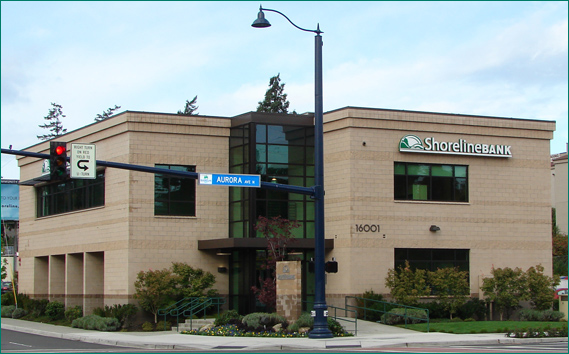October 1, 2010 – Shoreline Bank, Shoreline, Washington, was closed today by the Washington Department of Financial Institutions, which appointed the FDIC as receiver. The FDIC entered into a purchase and assumption agreement with GBC International Bank, Los Angeles, California, to assume all deposits and a portion of failed Shoreline’s assets.
According to GBC’s website, the bank was organized in 1972 as First Woman’s Bank of Los Angeles and later renamed Guaranty Bank of California. The bank was taken private by its current investors in 1992. In 2007 the bank changed its name to GBC International Bank and currently focuses on international trade financing in addition to commercial real estate financing and personal banking services.
Shoreline Bank had three branches which will reopen on Monday as branches of GBC International. Shoreline depositors will have full access to their accounts over the weekend and full FDIC coverage will continue on insured deposits.
Shoreline Bank, a community bank founded in 1999, has been operating under regulatory consent orders since December 2009. According to the Shoreline website:
The Order stipulates the major areas of focus for management and the Board of Directors. It is very consistent with the action steps we have been taking during 2008-09. These areas of focus are: asset quality, capital, earnings, management and liquidity.
Our Board, management and staff have worked very hard and are now building momentum resolving problem loans. We expect this momentum to continue during 2010. However, there is still significant uncertainty about real estate values and related aspects of our economy. In addition to progress on problem loans during 2009, we have reduced operating expenses further, raised capital, grown the community base of account holders, managed down asset totals to conserve capital, strengthened liquidity and effectively worked with depositors to maximize FDIC insurance coverage. We will continue to work hard on all these factors as part of our plan to return to profitability in a reasonable period of time.
Critical to our future is capital. Despite the success on this front in 2009 when we raised $3.6 million, raising more tier one capital in 2010 will be very important to the improvement plan. We will keep you advised of our recapitalization steps as they become final.

Interested in Becoming a Shoreline Bank Stockholder?
Note: Stock not available on a public exchange. Limited transaction history.
For inquiries or questions, please contact Jeff Lewis at 206-546-8484.
Shoreline’s attempt to raise additional capital included soliciting investors on its website to invest in its common stock, as noted above. Since stockholders have last priority on claims against the failed bank, it is very likely that all shareholders in Shoreline Bank are facing a complete loss on their investment.
Shoreline Bank, as of June 30, 2010, had total assets of $104.2 million and total deposits of $100.2. GBC will pay the FDIC a .25% premium to assume Shoreline Bank’s deposits. GBC only agreed to purchase $65.7 million or 63% of failed Shoreline’s assets, and entered into a loss-share transaction with the FDIC covering $49.2 million or 74% of the assets purchased. The FDIC is stuck with the remaining $38.5 million of Shoreline assets for later disposition. The FDIC is now holding over $40 billion in failed banking assets that need to be sold (see FDIC’s Mountain of Failed Bank Assets Grow).
The estimated loss to the FDIC Deposit Insurance Fund for the failure of Shoreline Bank is $41.4 million or a stunning 40% of Shoreline’s total assets. The most recent numbers for Shoreline Bank show a massive troubled asset ratio of 407% compared to a national average of 15. Most of the failed banks closed in 2010 had troubled asset ratios of over 100%.
Shoreline becomes the nation’s 129th banking failure this year and the tenth in Washington. The State of Washington is now in a fourth place tie with California for the most banking failures of 2010.
Speak Your Mind
You must be logged in to post a comment.